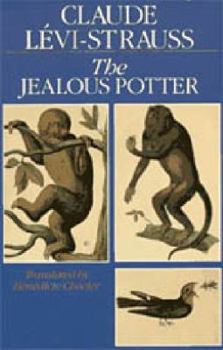The Jealous Potter
Select Format
Select Condition 
Book Overview
As L vi-Strauss freely explores the mythologies of the Americas, with occasional incursions into European and Japanese folklore, tales of sloths and squirrels interweave with discussions of Freud, Saussure, "signification," and plays by Sophocles and Labiche. L vi-Strauss critiques psychoanalytic interpretation and defends the interpretive powers of structuralism. "Electrifying. . . . A brilliant demonstration of structural analysis in action. . . . Can be read with pleasure and profit by anyone interested in that aspect of self-discovery that comes through knowledge of the universal and timeless myths that live on in all of us."--Jonathan Sharp, San Francisco Examiner-Chronicle "A characteristic tour de force. . . . One remains awed by him."--Colin Thubron, Sunday Times "With all its epistemological depth, the book reads at times like a Simenon or a Lewis Carroll, fusing concise methodology with mastery of style."--Bernadette Bucher, American Ethnologist " An] engagingly provocative exploration of mythology in the Americas. . . . Always a good read."--Choice "A playful, highly entertaining book, fluently and elegantly translated by B n dicte Chorier."--Wendy Doniger O'Flaherty, New York Times Book Review
Format:Hardcover
Language:English
ISBN:0226474801
ISBN13:9780226474809
Release Date:April 1988
Publisher:University of Chicago Press
Length:260 Pages
Weight:1.08 lbs.
Dimensions:2.8" x 5.8" x 8.8"
Customer Reviews
1 rating
Beyond the Birdnester
Published by Thriftbooks.com User , 19 years ago
Towards the end of "The Naked Man", the last volume of "Mythologies", a series that Levi-Strauss dedicated to following up on all the transformations of a single myth, which he calls "the Birdnester", throughout the indigenous cultures of the Americas, the author tackles a vexing question. Is it possible that his transformations have been defined so broadly that any myth at all can be considered a form of the Birdnester? His reply is that the native cultures of the Americas have another complex of myths which cannot be treated as simple variants of the Birdnester and which he therefore omitted from his study. Whereas the Birdnester myths present a theory of the origin of cooking fire, the myths in this other series present a theory of the origin of potter's fire. In the "Jealous Potter", Levi-Strauss finally presents this second group of myths. As always with Levi-Strauss, the reader is in for a fanstastic trip with innumerable insights into human cultures. One difficulty in reading Levi-Strauss: He mentions a a dazzling array of native groups and it is difficult to keep them all straight. I have found that the best solution is to consult the maps in John Bierhost's survey of American mythology. Here as elsewhere, Levi-Strauss's work provides a wide prospect of future studies. For example, one would like to know how the two complexes of myths are distributed in the Americas (and even beyond them). This would certainly shed light on cultural history of the Americas and the world.





